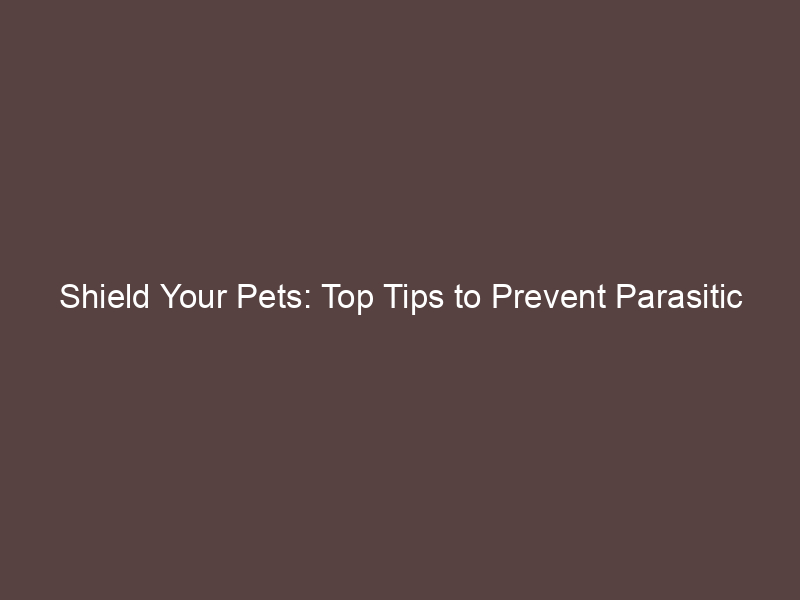
Introduction to Parasitic Infections in Pets
Parasitic infections in pets are more common than you might think. These infections can cause a variety of health problems for your furry friends, from mild discomfort to serious illness. In this article, we will explore what parasitic infections are and the common types that can affect your pets.
- Understanding what parasitic infections are
- Common types of parasitic infections in pets
- Roundworms: These are one of the most common types of parasites in pets. They live in the intestines and can cause symptoms such as diarrhea, vomiting, and weight loss.
- Heartworms: These parasites are transmitted through mosquito bites and live in the heart and blood vessels. They can cause serious heart disease and lung disease.
- Fleas: Fleas are external parasites that feed on the blood of their hosts. They can cause itching, hair loss, and skin infections.
- Ticks: Ticks are also external parasites that feed on the blood of their hosts. They can transmit a variety of diseases, including Lyme disease.
Parasitic infections occur when parasites, which are organisms that live on or in a host organism, invade your pet’s body. These parasites can cause harm to your pet by taking nutrients, causing damage to tissues, or even causing diseases. Parasites can be found in many different environments, and pets can become infected in a variety of ways, such as through contact with infected animals or by ingesting contaminated food or water.
There are several types of parasitic infections that can affect pets. Here are a few of the most common:
Understanding the types of parasitic infections that can affect your pet is the first step in protecting them. In the following sections, we will discuss why it’s important to prevent these infections, how to recognize the signs of a parasitic infection, and what you can do to keep your pet healthy and parasite-free.
Pet Parasite Prevention: Why It’s Important
Parasites are a common threat to the health and well-being of our beloved pets. They can cause a range of health issues, from mild discomfort to serious diseases. Therefore, it is crucial to understand the importance of pet parasite prevention. In this section, we will discuss the impact of parasitic infections on pet health and the cost of treating these infections.
- Impact of Parasitic Infections on Pet Health
Parasitic infections can have severe consequences on your pet’s health. Parasites, such as fleas, ticks, and worms, can cause a variety of health problems. For instance, fleas can cause skin irritation, hair loss, and infections. Ticks can transmit diseases like Lyme disease, which can lead to joint pain and fever. Worms can affect your pet’s digestive system, leading to weight loss, vomiting, and diarrhea.
Moreover, some parasites can even be fatal if not treated promptly. Heartworms, for example, can cause serious damage to your pet’s heart and lungs, leading to heart failure. Therefore, it is essential to take preventive measures to protect your pets from these harmful parasites.
- Cost of Treating Parasitic Infections
Treating parasitic infections can be quite expensive. The cost can vary depending on the type of parasite, the severity of the infection, and the treatment required. For instance, treating a mild flea infestation might cost around $50 to $100, while treating a severe heartworm infection can cost up to $1,000 or more.
Besides the direct cost of treatment, there are also indirect costs to consider. Your pet might require additional care and attention during the recovery period, which can take time and effort. Moreover, your pet might suffer from long-term health issues as a result of the infection, which can lead to further costs in the future.
Therefore, investing in preventive measures can not only protect your pet’s health but also save you from these high costs in the long run. In the next section, we will discuss some effective tips for preventing pet infections.
Pet Protection Tips: Preventing Pet Infections
Keeping your pets healthy is a top priority. One of the best ways to ensure their wellbeing is by preventing infections, particularly those caused by parasites. Let’s explore the importance of regular vet check-ups and what to expect during these visits.
Regular Vet Check-ups
Regular vet check-ups are an essential part of pet care. They not only help in early detection of potential health issues but also play a crucial role in preventing parasitic infections.
- Importance of regular vet visits
- What to expect during a vet check-up for parasites
Regular vet visits are crucial for your pet’s health. These check-ups allow the vet to monitor your pet’s overall health and detect any potential issues early. According to the American Veterinary Medical Association, pets should have at least one vet check-up per year. However, puppies, kittens, senior pets, and pets with health issues may need more frequent visits.
During a vet check-up for parasites, the vet will perform a thorough physical examination of your pet. They will check for signs of parasites such as fleas, ticks, and worms. This may include examining your pet’s skin and coat, checking their ears and mouth, and taking a stool sample. If parasites are detected, the vet will recommend appropriate treatment options.
Remember, prevention is always better than cure. Regular vet check-ups, along with proper hygiene practices, can go a long way in keeping your pet healthy and free from parasitic infections.
Proper Hygiene Practices
Proper hygiene plays a pivotal role in preventing parasitic infections in pets. It involves two key aspects: keeping your pet clean and maintaining a clean environment for your pet.
- Keeping your pet clean
Regular grooming is essential for your pet’s health. This includes bathing, brushing their fur, and cleaning their ears and teeth. Bathing helps to remove dirt and parasites that may be lurking in your pet’s fur. Brushing not only keeps your pet’s fur looking shiny but also helps to remove dead hair and skin, reducing the chances of infection.
Did you know that 80% of dogs and 70% of cats show signs of dental disease by age three? Regular teeth cleaning can prevent this. Cleaning your pet’s ears can also prevent infections and parasites.
- Importance of cleaning your pet’s environment
Just as important as keeping your pet clean is ensuring that your pet’s environment is clean. This includes their bedding, feeding bowls, toys, and the areas they frequent.
Parasites can live in the environment for months, waiting for a host. Regular cleaning can disrupt their life cycle and prevent them from infecting your pet. For instance, cleaning and changing your pet’s bedding regularly can eliminate flea eggs and larvae.
Feeding bowls should be cleaned daily to prevent the growth of bacteria and parasites. Toys should also be cleaned regularly, as they can become a breeding ground for parasites.
Remember, a clean environment is not only healthier for your pet but also for you and your family.
| Hygiene Practice | Benefit |
|---|---|
| Regular grooming | Removes dirt and parasites, reduces chances of infection |
| Teeth cleaning | Prevents dental disease |
| Cleaning pet’s environment | Disrupts parasite life cycle, prevents infection |
In conclusion, proper hygiene practices are an essential part of preventing parasitic infections in pets. By keeping your pet and their environment clean, you can protect them from harmful parasites and ensure their overall health and wellbeing.
Parasite Protection for Pets: Diet and Nutrition
One of the most effective ways to protect your pets from parasitic infections is through their diet. The food your pet consumes plays a significant role in strengthening their immune system and preventing parasitic invasions. Let’s delve into the role of diet in preventing parasitic infections and the recommended foods for boosting your pet’s immune system.
- Role of diet in preventing parasitic infections
A balanced and nutritious diet is crucial for your pet’s overall health. It not only keeps them active and happy but also builds a strong defense mechanism against parasites. A diet rich in essential nutrients enhances your pet’s immune response, making it harder for parasites to establish an infection.
Proteins, for instance, are vital for repairing and building tissues, while vitamins and minerals boost the immune system and help fight off infections. Fiber, on the other hand, aids in digestion and can help clear parasites from your pet’s system.
Feeding your pet a diet that lacks these essential nutrients can weaken their immune system, making them more susceptible to parasitic infections. Therefore, it’s important to provide a balanced diet that includes a variety of foods to ensure they get all the nutrients they need.
- Recommended foods for boosting your pet’s immune system
There are several foods you can incorporate into your pet’s diet to boost their immune system and protect them from parasites. These include:
- Lean meats: Lean meats such as chicken, turkey, and fish are excellent sources of protein, which is essential for a strong immune system.
- Fruits and vegetables: Fruits and vegetables are packed with vitamins and minerals that can boost your pet’s immune system. Some good options include carrots, peas, apples, and blueberries.
- Whole grains: Whole grains like brown rice and oatmeal provide fiber, which aids in digestion and can help clear parasites from your pet’s system.
- Fatty fish: Fatty fish like salmon and mackerel are rich in omega-3 fatty acids, which are known to boost the immune system.
Remember, every pet is unique and may have specific dietary needs. Always consult with your vet before making significant changes to your pet’s diet.
Pet Health and Parasites: Recognizing the Signs
Parasites can pose a significant threat to your pet’s health. It’s crucial to recognize the signs of parasitic infections early to ensure timely treatment. Here, we will discuss the common symptoms of parasitic infections in pets and when to seek veterinary help.
- Common symptoms of parasitic infections in pets
- Changes in appetite: Your pet may eat more or less than usual.
- Weight loss: Despite eating well, your pet might be losing weight.
- Diarrhea or vomiting: Frequent loose stools or vomiting can be a sign of parasitic infection.
- Scratching or skin irritation: Parasites often cause discomfort, leading your pet to scratch or bite at their skin.
- Lethargy: Your pet may seem tired or less active than usual.
- When to seek veterinary help
Parasites can cause a variety of symptoms in pets, depending on the type of parasite and the severity of the infection. Some common signs include:
If you notice any of the above symptoms in your pet, it’s important to seek veterinary help as soon as possible. Parasitic infections can lead to serious health problems if left untreated. A veterinarian can diagnose the issue and recommend the best course of treatment.
Remember, early detection and treatment are key to keeping your pet healthy and happy. Regular check-ups can also help prevent parasitic infections and ensure your pet is in the best possible health.
In conclusion, recognizing the signs of a parasitic infection in your pet is crucial for their health and well-being. If you notice any changes in your pet’s behavior or physical condition, don’t hesitate to seek veterinary help. Your pet’s health is too important to risk.
How to Prevent Parasites in Pets: Treatment Options
Parasites can cause a lot of discomfort and health issues for your pets. Fortunately, there are various treatment options available to help prevent these unwanted guests. Let’s explore some of the most common ones.
- Over-the-counter treatments
- Prescription treatments
Over-the-counter (OTC) treatments are readily available and can be a good first line of defense against parasites. These treatments include flea collars, sprays, and shampoos that can kill parasites on contact. They are generally safe for pets and can be used regularly to prevent infestations.
OTC treatments can also include oral medications that can be given to your pet to kill internal parasites like worms. These treatments are usually given once a month and can be a good option for pets that are at a high risk of getting parasites.
Prescription treatments are often more powerful than OTC options and are usually recommended for pets that have a severe infestation or for those that are not responding to OTC treatments. These treatments can include topical solutions, injections, or oral medications that are prescribed by a vet.
Prescription treatments can also include preventative medications that are given to your pet on a regular basis to prevent parasites from infesting your pet in the first place. These treatments are usually more expensive than OTC options, but they can be very effective at keeping your pet parasite-free.
Remember, it’s always important to consult with your vet before starting any new treatment for your pet. They can help you choose the best option for your pet’s specific needs and ensure that they are receiving the right dosage.
By being proactive and using these treatment options, you can help keep your pet happy, healthy, and parasite-free.
Tips for Preventing Pet Infections: Case Studies
Let’s take a closer look at two real-life examples that illustrate the importance of preventing and dealing with parasitic infections in pets.
- Case Study 1: Successful Prevention of Parasitic Infection
- Case Study 2: Dealing with a Severe Parasitic Infection
Meet Max, a lively Labrador Retriever. His owner, Sarah, is meticulous about Max’s health. She ensures that Max is regularly dewormed and keeps up-to-date with his vaccinations. Sarah also maintains a clean environment for Max, reducing his exposure to parasites.
Max’s diet includes foods that boost his immune system, making him less susceptible to infections. Sarah also regularly checks Max for signs of parasites and takes him for routine vet checkups. As a result, Max has never had a parasitic infection, demonstrating the effectiveness of preventive measures.
Now, let’s consider Bella, a charming Siamese cat. Bella’s owner, John, was not aware of the importance of parasite prevention. Bella contracted a severe parasitic infection, which went unnoticed until she started showing serious symptoms.
John rushed Bella to the vet, where she was diagnosed and treated. Bella’s recovery was long and arduous, but she eventually regained her health. This case underscores the importance of early detection and treatment of parasitic infections.
These two case studies highlight the importance of preventive measures and early detection in managing pet parasitic infections. It’s crucial to maintain a clean environment, provide a healthy diet, and schedule regular vet visits for your pets. Remember, prevention is always better than cure!
Pet Parasite Control: Key Takeaways
As we conclude our discussion on pet parasite control, let’s summarize the key points we’ve learned. These takeaways are essential in ensuring your pet’s health and happiness.
- Importance of Prevention
- Role of Regular Vet Check-ups
- Impact of Diet and Hygiene
Prevention is the first line of defense against parasites. By taking proactive measures, you can significantly reduce the risk of your pet contracting a parasitic infection. This includes regular use of preventative treatments, maintaining a clean environment, and avoiding areas known for high parasite activity.
Regular vet check-ups play a crucial role in pet parasite control. Veterinarians can detect early signs of parasitic infections and provide timely treatment. They can also provide personalized advice based on your pet’s breed, age, and lifestyle.
The diet and hygiene of your pet have a significant impact on their susceptibility to parasites. A balanced diet boosts your pet’s immune system, making them less likely to contract an infection. Good hygiene practices, such as regular bathing and grooming, can help prevent parasites from establishing themselves on your pet’s skin or fur.
In conclusion, pet parasite control is a multifaceted approach that requires consistent effort and attention. By understanding the importance of prevention, the role of regular vet check-ups, and the impact of diet and hygiene, you can ensure your pet lives a healthy, parasite-free life.
Pet Health Tips: Maintaining a Parasite-Free Environment
Keeping your pets healthy involves more than just feeding them well and taking them for regular check-ups. It also involves maintaining a clean and safe environment for them to live and play in. Here are some tips to help you achieve this.
- Keeping your home clean
One of the most effective ways to prevent parasitic infections in pets is by keeping your home clean. Regular cleaning can help eliminate any parasites that may have found their way into your home. Here are some steps you can take:
- Regular vacuuming: Vacuum your carpets, rugs, and furniture regularly to remove any flea eggs or larvae that may be present.
- Clean pet bedding: Wash your pet’s bedding in hot water at least once a week to kill any parasites.
- Disinfect surfaces: Regularly clean and disinfect surfaces that your pet comes into contact with, such as their feeding area.
- Safe outdoor practices for pets
It’s equally important to ensure that your pet’s outdoor environment is safe and free from parasites. Here are some tips:
- Regular yard maintenance: Keep your yard clean and free from debris where parasites can hide. Regularly mow your lawn and trim bushes to reduce the likelihood of ticks and fleas.
- Prevent contact with wildlife: Wildlife can carry parasites that can infect your pets. Keep your pets from interacting with wildlife as much as possible.
- Use parasite preventatives: Use flea and tick preventatives on your pets, especially if they spend a lot of time outdoors.
Remember, maintaining a parasite-free environment for your pets is crucial for their health and well-being. By following these tips, you can help ensure that your pets live a happy, healthy, and parasite-free life.






